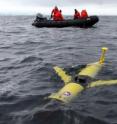Scientists call for a new strategy for polar ocean observation
In a report published in this week's issue of Science, a team of oceanographers, including MBL (Marine Biological Laboratory) Ecosystems Center director Hugh Ducklow, outline a polar ocean observation strategy they say will revolutionize scientists' understanding of marine ecosystem response to climate change. The approach, which calls for the use of a suite of automated technologies that complement traditional data collection, could serve as a model for marine ecosystems worldwide and help form the foundation for a comprehensive polar ocean observation system. The complexity of marine food webs and the "chronic under-sampling" of the world's oceans present major constraints to predicting the future of and optimally managing and protecting marine resources. "We know more about Venus than we do about the Earth's oceans," says Ducklow. "We need an ocean observation system analogous to meteorological monitoring for weather forecasting, but it's harder to do in the ocean."
In polar oceans in particular, including the Western Antarctic Peninsula (WAP) where Ducklow and his colleagues conduct research as part of the NSF's Long-Term Ecological Research project at Palmer Station, high operation costs and harsh conditions restrict the coverage provided by research ships, where much of the data on this ecosystem is collected. To overcome these hurdles, oceanographers around the world have been developing technologies to complement traditional data collection by research ships. The coordinated use of these technologies will enable sustained observations throughout the year in the polar oceans and could form the foundation for a comprehensive observation strategy the team says.
In their report the scientists, led by Oscar Schofield of Rutgers University, describe a multi-platform approach to ocean observation, where data is collected by a host of automated sources including glider robots that measure ocean characteristics continuously for weeks at a time and tourist vessels, ferries, and other "ships of opportunity" outfitted with chemical and biological sensors. The authors also encourage the deployment of oceanographic instruments on animals such as elephant seals and penguins to provide information on animal behavior and oceanographic conditions. Recent tagging of Adélie penguins nesting near Palmer Station has helped scientists understand the link between nutrient upwelling and penguin foraging.
"We're looking for ways to use our existing capabilities to obtain data," says Ducklow. "Our goal is to make things cheaper and get a lot of them out there. This will help to narrow down uncertainty about the effects of warming on the polar oceans in the coming decades to century."
The team says the WAP is an ideal location for monitoring the impacts of rapid climate change on marine ecosystems and could serve as a model observation system for marine ecosystems worldwide. The rapid climate change in this region is driving large-scale changes in the food web, impacting everything from phytoplankton—the foundation of the food web—to Antarctic krill, to apex predators such as penguins, whales, and seals.
"The comprehensive deployment of these observational systems will revolutionize our understanding of how marine ecosystems are responding to climate change everywhere, not just in Antarctica," says Ducklow. "With current observation methods, the data you collect, whether it's from land or from a research vessel, is limited to access by people. Where we are only getting dozens of measurements a year from data collected by people, you could get hundreds or thousands each day with the use of automated technologies."
This paper stems from work done as part of the National Science Foundation Office of Polar Program's Long-Term Ecological Research (LTER) project at Palmer Station, Antarctica. Hugh Ducklow is the principal investigator of the Palmer LTER. Besides Ducklow and Schofield, the paper's co-authors are Douglas Martinson, Columbia University's Lamont-Doherty Earth Observatory; Michael Meredith, British Antarctic Survey; Mark Moline, California Polytechnic State University; and William Fraser, Polar Oceans Research Group, Sheridan, MT.
Source: Marine Biological Laboratory
Articles on the same topic
- Oceanographers call for more ocean observing in AntarcticaFri, 18 Jun 2010, 14:36:24 UTC
